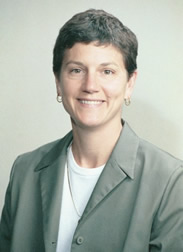

|

|
IN MEMORIAM
Jean Olson Lanjouw
Associate Professor of Agriculture & Resource Economics
Berkeley
1962 – 2005
Jenny Lanjouw died of renal cancer on November 1, 2005 – just three months after discovering she was ill. She died in Washington, D.C. where she shared a home with her husband, Peter, and their two children Max and Else. She was 43.
In addition to her faculty appointment at the University of California, Berkeley, Lanjouw held fellowships at the Brookings Institution and the Center for Global Development in Washington, D.C., and at the National Bureau of Economic Research in Cambridge, Massachusetts. Prior to joining Berkeley in 2002, she was a faculty member in the economics department at Yale University.
Lanjouw was born April 15, 1962 in Seattle, Washington and grew up in Oxford, Ohio, where she graduated summa cum laude in mathematics and economics from Miami University. She attended the master’s program in economics at the Delhi School of Economics in India, and received both her M.Sc. and Ph.D. in economics from the London School of Economics.
She had a diverse research portfolio. Rather than focus her energies on one narrowly defined research area, she worked in three different arenas. She did important empirical work on poverty and economic development, on law and economics, and on the economics of technological change. Much of her most fascinating and creative work was at the intersection of these areas of interest.
The hallmark of Lanjouw’s research in all three topics was the bringing together of extensive, highly detailed data, which usually took great effort and tenacity to collect; first-rate statistical skills; and new insights into how to approach long-standing research issues. It is the conjunction of these three elements that made Lanjouw such an excellent empirical economist.
Reflecting these strengths, Lanjouw made important contributions in a variety of areas. Her series of studies on patent litigation and on the value of patents were widely-read and influential. Lanjouw also made significant contributions in economic development. She studied the role of land titles in urban squatter communities in Guayaquil, Ecuador, and emphasized their interaction with informal property rights. Her development of statistical tools that combined census and detailed survey data to view poverty and inequality at the village or neighborhood level, received much attention from academics and development practitioners. But her most influential work focused on empirically understanding the relationship between policies regarding intellectual property rights and their impact on economic development and welfare.
Debates about intellectual property rights are almost always heated. Important controversies have swirled around the explosion of patent litigation in developed countries, and about the impact of patents on access to critical medicines in the developing world. Yet there has been relatively little empirical research into patent policy and its implications. Lanjouw threw herself into this arena and came up with original and daring policy prescriptions. Toward the end of her life, her ideas had begun to resonate not only in academic circles but in the newspapers and major business periodicals. “Jean Lanjouw advanced a solution to the heart-pill problem”, the Washington Post’s Sebastian Mallaby wrote in June 2005. “The idea would cost nothing: It merely involves drug companies giving up patent protection for heart pills and similar medicines in the poor world. Since poor countries buy almost none of these medicines anyway, giving up patent rights in those markets doesn’t hurt the drug firms. But it would mean that cheap generic versions of these medicines could be distributed to poor consumers”.
Not only did Lanjouw write thoughtfully about these challenging issues, she was willing to invest in understanding and influencing the public policy process—a willingness that is all too rare within the economics profession. Lanjouw devoted substantial time to meeting with government officials and business leaders on the vital topic of pharmaceutical protection in developing countries. These conversations helped her refine her ideas, and gave her the visibility and credibility that is a prerequisite to being a “player” in the public policy arena. In all such interactions she brought the same combination of academic rigor, creativity, and dedication that characterized her academic writings.
Lanjouw had a wide network of colleagues and collaborators. Her popularity derived in large part from the way that she combined charm, humor, and a keen sense of intellectual curiosity in her interactions. The voice that jumps out in her writing—lucid, collected, insightful, razor-sharp, yet leavened with warmth and wit—was very much a reflection of her fundamental nature.
Lanjouw, known as “Jenny” by friends and colleagues, was an empathetic and effective teacher who is sorely missed by her students. They appreciated her resolute cheerfulness, her fairness, and the way that she treated everyone equally regardless of their seniority.
Yet despite her commitment to research, teaching, and policy, Lanjouw’s greatest devotion was to her family. For seven years she commuted every week by train between New Haven and Washington, D.C. in order to be able to spend four days with her husband, Peter, a World Bank economist. Her years at Berkeley were filled with camping and hiking expeditions in the company of her family. Pictures of her daughter, Else, and son, Max, were scattered liberally throughout her office. Her conversations, and lectures, were peppered with anecdotes about her children and husband. Her greatest regret upon learning that her life would be cut short was that she would miss seeing her children grow up.
Jeffrey M. Perloff
Elisabeth Sadoulet
Sofia Villas-Boas